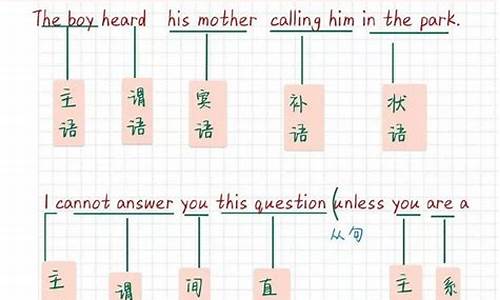您现在的位置是: 首页 > 搞笑语录 搞笑语录
_英语句子成分练习题与答案
tamoadmin 2024-09-09 人已围观
简介1.求汉语划分句子成分专项练习题2.高中定语从句练习题3.初中宾语从句 时间状语从句的语法和练习题有答案4.求 句子成分划分的练习题和答案5.初三英语练习题,在线等,急~~~语法好的进 以下是完整的总结和举例●先说说楼主想要的宾语补足语吧宾语补足语: (1) 补充说明宾语的动作、状态的成分为宾语补足语,常由名词、形容词、动词非谓语形式(不定式、现在分词、过去分词等)、介词短语等充当。如:Call
1.求汉语划分句子成分专项练习题
2.高中定语从句练习题
3.初中宾语从句 时间状语从句的语法和练习题有答案
4.求 句子成分划分的练习题和答案
5.初三英语练习题,在线等,急~~~语法好的进
以下是完整的总结和举例
●先说说楼主想要的宾语补足语吧★宾语补足语★:
(1) 补充说明宾语的动作、状态的成分为宾语补足语,常由名词、形容词、动词非谓语形式(不定式、现在分词、过去分词等)、介词短语等充当。如:Call him Jim, please. (请叫他Jim。) / I tried my best to make him hy. (我竭尽所能让他开心。) / Ask her to come to dinner tomorrow. (请他明天来。) / He let the smaller animals bring food to him. (他让小动物们给他带食物来。)
(2) 部分表示位置、方向的副词也可以作宾语补足语。如:Let him in, I tell you! (我跟你说,让他进来!)/ Please put it away. (请把它收起来。)
★楼主如果还不清楚再来看看█宾语补足语█详解,附有练习题哦。
Ⅰ.使役动词后宾语补足语的用法
中学教学中最常见的使役动词有:make, he, lee。他们都表示“使得”,后面都可接宾语+宾语补足语的结构,但用法上有所不同。
一?make用作使役动词表示“使;使成为”时,可跟复合结构,即“make+宾语+宾语补足语”,其中的宾语补足语可以是形容词或名词?不带to的不定式?过去分词。
1. 我们推选他为我们足球队队长。
We made him captain of our football team.
2. 我们队赢了的消息使我们大家非常高兴。
The news that our team had won made us very hy.
3. 大雨使得我们无法出去。
The hey rain made it impossible for us to go out.
4. 奇怪的声音使我们感到恐惧。
The strange noise made us frightened.
5. 在交通嘈杂声中他无法使自己的声音提高到让别人听到。
He couldn’t make himself heard above the noise of the traffic.
6. 什么东西使得草生长?
What makes the grass grow?
注意:过去分词作make的宾语补足语时,变为被动语态不用加to; 但当不定式作其宾补时,变为被动语态一定要加to。
这个男孩被迫每天干十二个小时的活。
The boy was made to work twelve hours a day.
选择题:
1. Paul doesn’t he to be made ____. He always works hard.
A. learn B. to learn C. learned D. learning
2. The result of the entrance exams was not made ____ to the public until last Thursday.
A. knowing B. known C. to know D. to be known
答案:1.B2.B
二?he 表示“使得……”,其后接宾语补足语, 常用以下句型:
he sb. do sth.使得某人做某事
he sb. doing sth.使得某人一直做某事
he sth. done使得某事被做
填空:
1. The teacher had her ____(recite) the text again.
2. He wants to he his eyes ____(examine) tomorrow.
3. Be careful, or you’ll he your hands ____(hurt).
4. He had the girl ____(stand) in the classroom the whole morning.
5. He had the walls ____(paint) this morning.
答案:1.recite 2.examined 3.hurt 4.standing 5.painted
只能用doing的情况
1. 表示正在发生
Be quick. They he the car waiting for you at the school gate.
2. 否定句中表示(不能)容忍某人做……
I won’t he him cheating in the exam.
3. 表示某一时间内一直延续不断的动作
He had us laughing all through the meals.
选择?填空题:
1. I’ve had my radio ____ so soon because my father had me ____ it. A. repair; done B. repaired; do C. repairing; do D. repaired; done
2. You can’t he the horse ____ all the way. It’s too hot.
A. run B. to run C. running D. to be running
3. Mrs. Brown was much disointed to see the washing machine she had had ____ went wrong again.
A. it B. it repaired C. repaired D. to be repaired
4. We will he you ____(know) that the machine has been made ____(work) at full speed.
答案:1.B 2.C 3.C 4.know, to work
三?lee作使役动词,表示“使/让……保持某种状态”。
1. 用形容词作宾语补足语
出去时,不要关门。Lee the door open when you go out.
他的疾病使得他身体很虚弱。His illness left him very weak.
2. 还可用名词?介词短语等作宾语补足语
他父母去年双双去世,留下他成为一个孤儿。
His parents both died last year, leing him an orphan.
3. 用现在分词作宾语补足语
他们走开了,让我一个人坐在那儿。
They walked off and left me sitting there alone.
他出去时,把他的文件摊在桌子上。
He went out, leing his papers lying open on the desk.
4. 用过去分词作宾语补足语
Did you lee the doors and windows properly fastened?
He left a few questions unanswered.
Ⅱ.感官动词后宾语补足语的用法
表示感觉和心理状态的动词,如hear, feel, find, listen to, look at, watch, notice, observe, smell, see等词后可以用省去to的动词不定式,现在分词及过去分词作宾语补足语。常见的句型有:(以hear为例)
hear sb. do sth.
heahear sth. done
填空?选择题:
1. I’ve never heard the song ____(sing).
2. Do you smell something ____(burn)?
3. Tom saw his parents ____(get) into the car and ____(drive) off.
4. He was seen ____(drive) the car at high speed on the highway yesterday.
5. The managers discussed the plan that they would like to see ____next year.
A. carry out B. carrying out C. carried out D. to carry out
6. ——Did you hear her ____ this pop song this time the other day?
——Yes, and I heard this song ____ in English.
A. sing; singing B. sung; sung C. sung; singing D. singing; sung
7. I saw her ____ when I came into the classroom.
A. cry B. to cry C. crying D. cries
答案:1.sung 2.burning 3.get; drive 4.to drive 5.C 6.D 7.C
Ⅲ.with+宾语+宾语补足语的结构
1. with+宾语+形容词/副词/介词短语
1) 他过去常常开着窗子睡觉。
He used to sleep with the window open.
2) 他们离开了房间,灯还亮着。
They fled the room with lights still on.
3) 他双手放在口袋里走了进来。
He stepped in, with his hands in his pockets.
4) 脖子上没带项链的那位女士是玛丽的朋友。
The woman, without a necklace around her neck, was a friend of Mary’s.
2. with+宾语+doing/done/to do
1) The day was bright with a fresh breeze blowing.
(-ing表示主动/正在进行)
2) With the matter settled, we went home. (-ed表示被动/状态)
3) They are highly mechanized farms, with machines to do all the work.
4) With Tom to help me, I can finish the work in time.
(to do表示即将发生)
选择?填空题: 外语爱好者论坛 → 英语学习 → 中学英语
1. ____ production up by 60%, the company has had another excellent year.
A. As B. For C. With D. Through
2. ____ everything ____, she left the supermarket with satisfaction.
A. As; buying B. For; to buy
C. With; bought D. Because; to buy
比较:____ everything was bought, she left the supermarket.
3. ____ years ____, her hair grows white.
A. As; passing by B. With; go by
C. As; pass D. With; passed
4. His mother ____(be) ill, he had to stay at home, looking after her.
5. He stood there, with his eyes ____(fix) on Della.
6. He stood there, ____(fix) his eyes on Della.
7. He stood there and his eyes ____(fix) on Della.
答案:1.C 2.C 比较As 3.C 4.being 5.fixed 6.fixing 7.were fixed
r sb. doing sth.
如果还需要主语 谓语 宾语详解,请楼主联系我哦。
■祝楼主学习顺利№1■
求汉语划分句子成分专项练习题
Susan is not the brilliant writer _____ she used to be.
A. which B. that C. who D. whom
They stayed with me for three weeks, _____ they drank all the wine I had.
A. which B. which time C. during which D. during which time
It is the one of the best films_____.
A. which he been made in China B. that has ever been made in China
C. that he ever been made in China D. which has been made in China
The old man finally got a chance to visit the school, _____ he used to study, _____ he had been dreaming of for years.
A. that… which B. where… that C. in which…what D. where…which
_____ all that _____ to be done been done?
A. He...he B. He…has C. Has…has D. Has…he
--Why am I so slow at doing the cloze test? --I guess you didn't realize the use ______ the contexts.
A. you should he made of B. you must he made from
C. from which you could he made D. out of which you need make
Don’t lee the knife _____. Which is wrong?
A. in a place where children can get it B. where children can get it
C. in a place which is within children’s reach D. in which children can get it
I’m looking for a present for my mother’s birthday, _____ she can use and at a reasonable price.
A. that B. one C. what D. which
The curious child didn’t believe the fact _____.
A. that most of them thought it to be true B. most of them thought to be true
C. what most of them thought was true D. as most of them thought true
Nothing but a few pictures _____ given to Tom, _____ he was fond of.
A. was…which B. were…which C. was…that D. were…that
The conclusion _____ the police came to _____ he was innocent didn’t satisfy everybody.
A. that…which B. /…that C. which…which D. that…/
Among all the contestants, only Mary _____ had supposed could win the first prize.
A. who B. / C. I D. that
To se money for my education, my mother often takes on more work _____ good for her.
A. than what is B. than that is C. than it is D. than is
I feel disointed as the new house isn’t quite _____ it should be.
A. as B. that C. what D. which
The scientists and technicians overcame a lot of difficulty _____ the personal computer.
A. they had developing B. hing developing
C. they had developed D. that had to develop
答案是BDBDC ADBBA BCDCA
1B。当先行词为主句的表语,或者关系代词为从句的表语的时候,那么只能选that。这是13种只能用that的情况中的一种。
2D他们和我在一起三个星期了,在那段时间里,他们喝光了我所有的酒。先行词后面的关系词在从句中是作为状语的,所以首先排除A,which作为状语,就只能在其前面加一个介词,这是因为介词+which=关系副词,故而排除B,而在非限制性定语从句中表示时间状语的,就只能用during which time。
3B这是目前为止中国拍得最好的一部片子了。定语从句中如果先行词被最高级修饰,那么关系代词一定是that,因此排除A,D。中心词虽然是the best films,但前面还有一个one,同时it后面的is 也很好地暗示了从句中谓语动词只能用单数,所以选B
4D,这个老人最终有机会访问他曾经就读过的学校,他梦想回到母校已多年了。Study是一个不及物动词,因此后面没有必要加宾语,因此排除A,后半句是一个非限制性定语从句,其中dream of的of 缺少一个宾语,所以得选一个关系代词,故而排除B,这里是定语从句,而不是主语从句所以排除C,which指代的是got a chance to visit the school这件事,因而选which
5C那些必须去做的事做完了吗?all指人时,动词用复数;all指物时,动词用单数
所以这两个空,都选择has,排除A,B,D
6A 为啥我做填空如此之慢?我猜你没有意识到去运用(make the use of )上下文。从 didn’t可以确定,前面说到的那个人没有利用,should he done 本应该而没有,正好与原题题意相符,因此选A
7D,不要把刀放在孩子容易够得着的地方,介词+which结构中的介词往往是根据定语从句中谓语动词的固定搭配来决定的。而 get in的意思是1.进入,参加;收(获),收回;插入(放) 2.收获;收(税等);抵达 3.进入, 收获,达到。
Get in 虽然有达到的意思,但是get in 中的in后面的which应该是指代地点,而前面没有表示地点的先行词place,只有一个knife,也就是说D是缺少了一个先行词。如果D换成in a place in which children can get it则可以
8Bpresent和后半句之间有逗号隔开,但后半句不是非限制性定语从句。如果是的话,那么后半句应该是____she can use and is at a reasonable price. 如果没有了is 的话,那么and 后面的at a reasonable price就不能和空格中的关系词构成一个完整句了。所以关系词one是一个同位语。后面一半是同位语从句,而另一半是介词短语作为同位语one的后置定语。
9B 这道题的陷阱就是考生对于见到the fact that时 的定势思维。如果这是一个the fact that引导的同位语从句,那么that后面应该是对fact的具体阐释,如the fact that地球围绕太阳转。但选项中most of them thought it to be true不是对fact的具体阐释,而是人们对fact 的看法,这就是这道题的所在。因此这是一个宾语从句,the fact也是作为thought的宾语,因此关系代词that可以省略,还原之后就是The curious child didn’t believe the fact (that) most of them thought to be true
10A当主语后面跟有with, together with, like, except, but, no less than, as well as 等词引起的短语时,谓语动词与前面的主语一致。因此第一个空用单数,后半句是一个非限制性定语从句,fond of 后面少了一个宾语,而非限制性定语从句中which正好可以充当宾语,因此选A
11B警察得出他无罪的结论不能让众人满足。
你要注意:“警察得出的结论”中的“的”说明The conclusion _____ the police came to 是一个定语从句,The conclusion_____ he was innocent.才是一个同位语从句。因此第一个空选that或者which都无所谓,第二个空必然为that。
从这题可以看出,命题人的一大乐趣就是在一个从句里面安插其他干扰性成分,然考生出错,这题和第九题还是很相似的考法。所以,考生须学会怎样根据句子的结构来简化句子,找到解题的思路。
12C在所有的参赛者当中,(人们)认为只有Mary可以获得第一名。
Among all the contestants, only Mary could win the first prize.是主句。
Suppose的所有用法中,只有be supposed to be 与题目的意思相吻合,所以had supposed是一个过去分词作为后置定语,而不是从句。
13这题感觉是选A,这个句子考查了more than 的比较结构,其中than是一个连词,所以其语法属性相当于and。所以分析这个句子的语法结构的时候,more than是不造成语法干扰的,你可以把more than拿掉,原句就变为To se money for my education, my mother often takes on work __what is ___ good for her.
14C 如果把空格后面的句子it should be 遮住,你会发现前面 isn’t quite后面缺少表语,而后面be动词后面也是缺少了一个表语,所以后半句是一个表语从句,表语从句中that是连词,不充当句子成分,what除了充当引导词还在从句中长当成分,所以选what
15A在研发个人电脑的时候,科学家和技师们克服了许多困难。
Difficulty很明显是一个定语从句,如果在had 和developing之间加一个逗号,你会发现,原来developing the personal computer是非谓语形式做伴随状语的。
题干的中文还可以这样翻译:
Developing the personal computer,the scientists and technicians overcame a lot of difficulty they had 。这句话和题干的意思是不是一模一样只不过这句话的伴随状语Developing the personal computer放到了前面,而题干是将之放到了后面!!只是语序变了一下就形成了难度。这是一道技巧性很强的题目,值得细细品味。
追问
非常感谢~感觉老师很强大···写了这么多,基本上搞清楚了··
定语从句里面杂糅了那么多其他的句型,真是令人头疼
还有那个第四题为什么排除b,那个that不能作关系代词么
回答
高中的语法只要把握了规律,再辅之以一定量的练习,并好好总结,不要为了做题而做题,做题的目的是把盲点扫除,就好说了。
_____ he had been dreaming of for years.是一个非限制性定语从句,而dream of的of 缺少宾语,所以既能引导非限制性定语从句,同时又能作为非限制性定语从句的宾语,就只能选which,而不能选that了,这就是排除B的原因啦。
高中定语从句练习题
句子成分
由不同词类的单词,按照一定的语法规则组合在一起,能表达一个完整意思的语言单位叫做句子。一个句子由各个功能不同的部分构成,这些部分叫做句子成分(members of the sentence)。英语的句子成分有八种:主语、谓语动词、表语、宾语、定语、状语、主语补足语和宾语补足语。现分述如下:
(一)主语
主语(subject)是句子所要说明的人或事物,是句子的主体。主语的位置通常在句首,一般不省略。可以担当主语的有名词、代词、数词、动词不定式、动名词和主语从句。例如:
Walls he ears.
隔墙有耳。(名词做主语)
He will take you to the hospital.
他会带你去医院。(代词做主语)
Three plus four equals seven.
三加四等于七。(数词做主语)
To see is to believe.
眼见为实。(动词不定式做主语)
Smoking is not allowed in public places.
公共场所不允许吸烟。(动名词做主语)
Whether or not they will come depends on the weather.
他们来不来取决与天气。(从句做主语)
(二)谓语动词
谓语动词(predicate verb)是说明主语的动作或状态的句子成分。谓语动词的位置一般在主语之后。谓语动词由实义动词或系动词担任。助动词或情态动词加其他动词的适当形式也构成谓语动词。例如:
Action speaks louder than words.
百说不如一干。
The chance may never come again.
这样的机会恐怕不会再来。
Tom was very sick at heart.
汤姆心里非常难过。
Mary has been working at the dress shop since 1994.
自1994年以来,玛丽一直在那家服装店工作。
(三)表语
表语(predicative)是用来说明主语的身份、特征和状态的,它的位置在系动词之后。可作表语的有名词、代词、形容词与分词、数词、动词不定式、介词短语、副词以及表语从句等。例如:
My father is a professor.
我父亲是一位教授。(名词作表语)
Who's that? It's me.
是谁呀?是我。(代词作表语)
Everything here is dear to her.
这里的一切她都感到亲切。(形容词作表语)
The match became very exciting.
比赛变得很紧张。(分词作表语)
The story of my life may be of help to others.
我的生活经历对别人可能有帮助。(介词短语作表语)
Three times five is fif.
三乘五等于十五。(数词作表语)
His plan is to seek work in the city.
他的是在城里找工作。(动词不等式作表语)
My first idea was that you should hide your feelings.
我最初的想法是你应当掩饰你的感情。(从句作表语)
(四)宾语
宾语(object)表示动作的对象,是动作的承受者。宾语一般放在及物动词之后。英语介词后也会跟宾语。可作宾语的有名词、数词、代词、动名词等。不定式也可作及物动词的宾语。例如:
she covered her face with her hands.
她用双手蒙住脸。(名词短语作宾语)
We hen't seen her for a long time.
我们好长时间没看到她了。(代词作宾语)
Do you mind opening the window?
打开窗户你介意吗?(动名词作宾语)
Give me four please.
请给我四个。(数词作宾语)
He wants to dream a nice dream.
他想做一个好梦。(动词不定式短语作宾语)
We need to know what others are doing.
我们需要了解其他人都在干什么。(从句作宾语)
I lived in Japan in 1986.
我1986 年住在日本。(名词和数词作介词的宾语)
(五)定语
定语(attribute)是修饰名词或代词的词、短语或句子。单词作定语时通常放在它所修饰的名词之前;短语和从句作定语时则放在它所修饰的名词之后。作定语的有名词、形容词、数词、分词及其短语、不等式及其短语、介词短语以及定语从句等。例如:
They are woman workers.
她们是女工。(名词作定语)
Tom's father didn't write home until yesterday.
汤姆的父亲直到昨天才给家里写信。(所有格名词作定语)
Equal pay for equal work should be introduced.
应当实行同工同酬。(形容词作定语)
The play has three acts.
这出戏有三幕。(数词作定语)
This is her first trip to Europe.
这是她首次欧洲之行。(代词、数词和介词短语作定语)
China is a developing country.
中国是一个发展中国家。(分词作定语)
You hen't kept your promise to write us often.
你没有遵守给我们经常写信的诺言。(动词不定式短语作定语)
My cat has a good nose for milk.
我的猫对牛奶嗅觉灵敏。(介词短语作定语)
Those who want to go to Tibet are to sign their names here.
想去西藏的人须在此签名。(从句作定语)
(六)状语
状语(adverbial)是修饰动词、形容词、副词等的句子成分。状语表示地点、时间、原因、目的、结果、条件、让步、程度、方式、伴随情况等。作状语的有副词、名词、介词短语、分词及其短语、动词不定式及其短语、状语从句等。例如:
These products are selling quickly.
这些产品现在十分畅销。(副词作状语)
He is knee deep in snow.
他踩在齐膝深的雪里。(名词作状语)
The best fish swim near the bottom.
好鱼居水底。(有价值的东西不能轻易得到。)(介词短语作状语)
She sat there doing nothing.
她坐在那里无所事事。(分词短语作状语)
We'll send a car over to fetch you.
我们将派一辆车去接你。(动词不定式短语作状语)
She was slow to make up her mind.
她迟迟不能下决心。(动词不定式短语作状语)
Strike while the iron is hot.
趁热打铁。(从句作状语)
There is no such a word in English so far as I know.
据我所知,英语里没有这样一个词。(从句作状语)
(七)宾语补足语和主语补足语
英语有些及物动词,除了要有宾语之外,还要加上宾语补足语(object complement),才能使句子的意义完整。宾语和宾语补足语一起构成复合宾语。如果上述结构变成被动语态,原宾语成为主语,原宾语补足语相应地变为主语补足语(subject complement)。可以担当补足语的有名词、形容词、介词短语、动词不定式、分词等。例如:
They elected me captain of the team.
他们选我当队长。(名词短语作宾语补足语)
He made me ashamed of myself.
他使我感到惭愧。(形容词短语作宾语补足语)
We found everything there in good order.
我们发现那里的一切井井有条。(介词短语作宾语补足语)
I should advise you not to miss the chance.
我劝你不要错过机会。(不定式短语作宾语补足语)
I could feel my heart beating fast.
我可以感觉出自己的心跳得很快。(分词短语作宾语补足语)
Some goods are left unsold.
有些货物剩下未出售。(分词做主语补足语)
She was elected director of public relations.
她被选为公关部主任。(名词短语做主语补足语)
词类与句子成分既有区别又有联系。词类是孤立的单词的分类;而句子成分则指单词、词组、短语或从句在句中的作用。句子的各种成分总是由属于一定词类的单词(或词组、短语、从句)来担当的。因此在词类和句子成分之间存在着某种对应关系。现将这种对应关系列表如下:
主语
宾语
表语
定语
状语
宾(主)语补足语
名 词
√
√
√
√
√
√
代 词
√
√
√
√
√
形容词
√
√
√
副 词
√
√
数 词
√
√
√
√
√
不定式
√
√
√
√
√
√
分 词
√
√
√
√
动名词
√
√
√
√
介词短语
√
√
√
√
动词中的实义动词和系动词可以担当谓语。动词不定式、分词和动名词形式不能独立担当谓语。介词是虚词的一种,不能独立担当句子成分,但介词加上其后的宾语所构成的介词短语,可在句中担当多种成分。
初中宾语从句 时间状语从句的语法和练习题有答案
高考英语试题中定语从句与强调句陷阱题详解
2008-12-15 22:24:06 来源:网络 作者:佚名 大 中 小 点击:126 次 评论:次
1. The factory was built in a secret place, around _________ high mountains.
A. which was B. it was C. which were D. them were
陷阱容易误选A或B,将A、B中的 which 和 it 误认为是其后句子的主语。
分析最佳答案是C,around which were high mountains 是一个由“介词+which”引出的非限制性定语从句,而在该从句中,主语是 high mountains,around which 是表语,所以句子谓语应用复数were,而不是用单数 was。请做以下类例题目(答案均为C):
(1) Yesterday we visited a modern hospital, around _________ some fruit shops.
A. which is B. it is C. which are D. them are
(2) The murder hened in an old building, beside _________ the city police station.
A. which are B. it is C. which is D. them are
(3) Next month we’ll move to a new building, next to _________ a nice restaurants where we can he Chinese food.
A. which are B. it is C. which is D. them are
2. A man with a bleeding hand hurried in and asked, “Is there a hospital around _________ I can get some medicine for my wounded hand”
A. that B. which C. where D. what
陷阱容易误选 B,认为 around 是介词,选 which 用以代替前面的名词 hospital,在此用作介词 around 的宾语。
分析最佳答案为C。以上语法分析并不算错,但问题是,照此分析,此句的意思即为:有没有这样一个医院,我在它的附近可以买药治我的手伤?这样的语境显然有点不合情理,因为人们通常是在医院里面治伤,而不是在医院附近治伤。此题选 C 的理由是:句中的 around 不是介词,而是副词,意为“在附近”;其后的 where 引导定语从句用以修饰其前的地点名词 hospital,句意为:附近有没有一家医院,我可以去治我的手伤?
3. Did is such a good boy _________ all the teachers like.
A. that B. who C. as D. whom
陷阱此题容易误选A,许多同学一看到题干中的such,再联系到选项中的 that,便认为这是考查such … that …句式。况且,这样理解意思也还通顺。
分析最佳答案为C,不是A,因为在such … that … (如此……以至……)结构中,that 引导的是结果状语从句,并且 that 在从句中不充当句子成分,若在上句填入 such … that …,句末的动词 like 缺宾语。选C的理由如下:as 用作关系代词,用以引导定语从句,修饰其前的名词 boy,同时 as 在定语从句中用作动词 like 的宾语,句意为“所有老师都喜欢的一位好男孩”。有的同学可能还会问,若选A,能否将其后的 that 视为引导定语从句的关系代词呢?不能,因为当先行词受到 such 的修饰时,其后的定语从句应用关系代词 as 来引导,而不用that。比较下面一题,答案为A,因为 like 后有自己的宾语 him:
Did is such a good boy _________ all the teachers like him.
A. that B. who C. as D. whom
请再做以下试题(答案选D):
It was not such a good dinner _________ she had promised us.
A. like B. that C. which D. as 4. The buses, most of _________ were already full, were surrounded by an angry crowd.
A. that B. it C. them D. which
陷阱容易误选 C,用 them 代指 the buses。
分析最佳答案是D。most of which were already full 为非限制性定语从句,修饰 the buses。类似地,以下各题也选D:
(1) His house, for _________ he paid $10, 000, is now worth $50, 000.
A. that B. it C. them D. which
(2) Ashdown forest, through _________ we’ll be driving, isn’t a forest any longer.
A. that B. it C. them D. which
(3) This I did at nine o’clock, after _________ I sat reading the paper.
A. that B. it C. them D. which
类似地,以下各题选 whom,不选 them:
(4) George, with _________ I played tennis on Sundays, was a warm-hearted person.
A. that B. him C. them D. whom
(5) Her sons, both of _________ work abroad, will come back home this summer.
A. that B. who C. them D. whom
(6) I met the fruit-pickers, several of _________ were still university students.
A. that B. who C. them D. whom
5. He had a lot of friends, only a few of _________ invited to his wedding.
A. whom B. them C. which D. who
陷阱容易误选 A,认为这是非限制性定语从句。
分析最佳答案是B,这不是非限制性定语从句,而是一个独立主格结构,因为空格后的动词 invited 并不是一个完整的谓语,而是一个过去分词。当然,若在 invited 前加上助动词 were,则是一个非限制性定语从句,答案便应选A。比较:
(1) They put forward a lot of plans at the meeting, none of _________ carried out in their work.
A. which B. them C. what D. that
答案选B,none of them carried out in their work 是独立主格结构,其中的 carried out 为过去分词
(2) They put forward a lot of plans at the meeting, none of _________ were carried out in their work.
A. which B. them C. what D. that
答案选A,none of them were carried out in their work 是非限制性定语从句,注意与上例比较句中多了一个助动词were。
(3) They put forward a lot of plans at the meeting, but none of _________ were carried out in their work.
A. which B. them C. what D. that
答案选B,由于两句之间增加了一个并列连词but,使得该句成了一个并列句。
6. On Sundays there were a lot of children playing in the park, _________ parents seated together joking.
A. their B. whose C. which D. that
陷阱容易误选B,认为这是非限制性定语从句。
分析最佳答案是A。与上面一题相似,their parents seated together joking 不是非限制性定语从句,而是一个独立主格结构,因为空格后的动词 seated 不是谓语,而是一个过去分词,因为 seat 作动词用时,是及物动词。比较以下相似题:
(1) On Sundays there were a lot of children playing in the park, _________ parents were seated together joking.
A. their B. whose C. which D. that
选B。whose parents were seated together joking 为非限制性定语从句,因为其后有完整的谓语 were seated。
(2) On Sundays there were a lot of children playing in the park, and _________ parents were seated together joking.
A. their B. whose C. which D. that
选A。因为句中有并列连词and,整个句子为并列句。
(3) On Sundays there were a lot of children playing in the park, _________ parents sitting together joking.
A. their B. whose C. which D. that
选A。their parents sitting together joking 为独立主格结构。
(4) On Sundays there were a lot of children playing in the park, _________ parents sat together joking.
A. their B. whose C. which D. that
选B。whose parents sat together joking 为非限制性定语从句,因为句中有完整的谓语 sat。
(5) On Sundays there were a lot of children playing in the park, _________ parents were sitting together joking.
A. their B. whose C. which D. that
选B。whose parents were sitting together joking 为非限制性定语从句,因为句中有完整的谓语 were sitting。
7. If the man is only interested in your looks, _________ just shows how shallow he is.
A. as B. which C. what D. that
陷阱容易误选A或B,误这是非限制性定语从句。
分析正确答案为D,注意逗号前是一个条件状语从句,逗号后是该状语从句的主句,that 在此代表前文所述的情况,用作主句的主语。类似地,下面几道题也选 that,而不选 which:
(1) If you promise to go with us, _________ will be OK.
A. as B. which C. and it D. that
(2) If you want a double room, _________ will cost another £15.
A. as B. which C. what D. that
(3) Whether you go or not, _________ is quite all right with me.
A. that B. which C. and it D. so
(4) When I say two hours, _________ includes time for eating.
A. as B. which C. what D. that
求 句子成分划分的练习题和答案
宾语从句分为引导词,语序和时态
1.当从句部分表示陈述语气时,由连词that引导宾语从句,that在句中无词义,不担当句子成分,所以常被省去。
例:I belive (that)he will come tomorrow.
2.当从句表示一种疑问或表示选择时,由连词whether或if引导宾语从句。
例:I want to know whether/if he likes the new house.
3.当从句部分表示特殊疑问句时,有连接代词或副词引导宾语从句。
例:I know where he lives.
二.语序
特点:无论主句是什么句式,宾语从句必须是陈述句语序。
例:Do you know what I mean?
三.时态
1.当主句中的谓语动词是一般现在是的时候,宾语从句可根据需要,选用任何事态。
例:He says he likes biue very much.
2.如果主句中的谓语动词时一般过去式,宾语从句中的谓语动词应用过去的某种时态。
例:Mother said she would go shopping on Saturday.
3.如果宾语从句表示的是客观真理,字眼现象,科学原理等,从句的时态不受主句谓语动词时态的限制,仍用一般现在时。
例:When I was young,I knew the earth moves around the sun.
初三英语练习题,在线等,急~~~语法好的进
1 孔子(主语)是(谓语)中国历史上(补语)伟大(状语)的教育家(宾语)。2他(主语)想要(状语)改正错误(谓语)3庄子的(状语)学说(主语)是(谓语)一种(补语)崇高()状语的美学(宾语)一下不一一分析了,有个口诀给你和建议,不懂再问吧。主谓宾定状补,一般成分弄清楚。基本成分主谓宾,附加成分定状补。动词涉及人或物,涉及成分叫宾语。修饰限制算定状,补充说明就是补。定语用在主宾前,谓前为状谓后补。还有标志的地得,帮助分清定状补。注意位置和关系,认真分析莫疏忽。单句的划分1、划分符号用“?”划分主语和谓语。用“”标出宾语。用“( )”标出定语。用“[ ]”标出状语。用“< ”标出补语。如果要求进一步分析用作一个句子成分的主谓短语时,可以在主语下面划“?”,谓语下面划“—”。“?”划在句前,表示非主谓句,其结构关系的名称,可以在?上注明。2、划分方法一次划分:先用“?”界分出主语和谓语,如果有宾语,也要划出。然后,再找出主、谓、宾的中心语,用“ ”标示出来。例如:伟大的人民?一定创造出伟大的时代。二次划分:到主语和宾语的中心语前划定语,到谓语的中心语前或句首划状语,再到谓语中心语后划补语。例如:(伟大)的人民?[一定]创造<出(伟大)的时代。3、复杂单句要进行分析时,需先找出主干。 单句的主干是指把句中所有的定语、状语、补语都压缩掉以后剩下的部分,也就是主语(或主语的的中心语)+动词(或动词的中心语)+宾语(或宾语的中心语)。找出句子主干常常是检查病句的好方法。摘取句子的主干,是为了掌握原句的结构,对理解原句的意思有帮助。但是,必须注意,句子的主干不等于原来的句子,意思没有原句那样明确,有的甚至跟原句相去很远。还要注意,在摘取否定句主干时,一般要把否定词一起摘出来。单句若是由复杂的短语构成时,单句也就成了复杂的单句。位置和关系,认真分析莫疏忽。
a)noun b) pronoun c) adjective d) verb
1 A __verb___ shows action or helps to make a statement by linking the subject to the predicate.
2 A __pronoun___ names.
3 A ___noun__ takes of the place of a noun.
4 A __adjective___ modifies a noun or pronoun.
a) adverb b) pronoun c) conjunction d) interjection
1 __interjection___ shows strong feeling
2 ___conjunction__ relates a noun or group op words
3 ___adverb__ modifies a verb, an adjective, or ANOTHER ___adverb__
III Identify the part of speech of each underlined word 我用括号了
a) noun b) preposition c) interjection d) verb e) adverb f) conjunction g) pronoun
1 There was not a cloud (in) [preposition] the sky
2 Matthew Henson (reached) [verb]the North Pole in 1909
3 (Oh!)What a lovely surprise [ interjection ]
4 The students (carefully) [adverb]prepared for the test
5 The (report) is due tomorrow [noun]
6 I submitted a (cartoon) [noun]to the school paper
7 We sat (under) [preposition]a shade tree
8 Will Tina (or) [conjunction]Ann lead the band?
9 Jennifer asked (me) [pronoun]for your address
IV Identify the word that is NOT the same part of speech as the others
1 a. writer b. ouch c. baseball d. sympathy B 非名词
2 a. wow b. these c. huge d. green B 非 形容词
3. a. she b. themselves c. across d. who C 非 pronoun
4. a. slowly b. outside c. later d. because because 非副词
5. a. run b. work c. several d. think C 非动词
6. a. on b. in c. is d. over C 不是介词
此类题要弄明白各类词性,我给你总结一下
noun 名词
verb 动词
adjective 形容词
adverb 副词
proposition 介词 on, in, over, under, at,
上一篇:情感短句文案_浪漫短句文案









